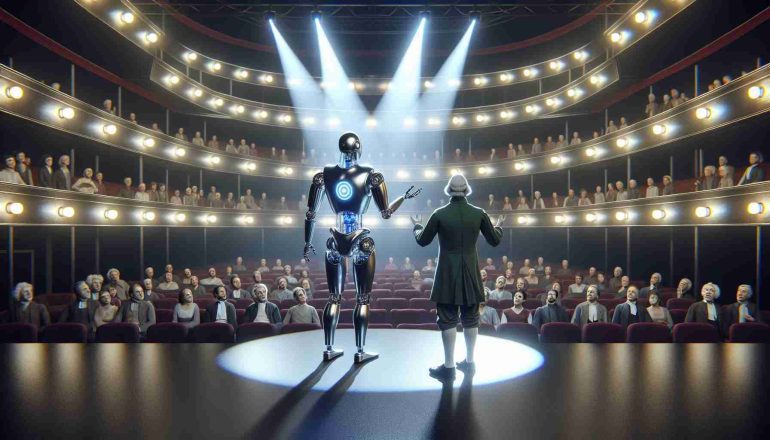- Claire West introduces “ECHO,” a groundbreaking production merging human performance with AI, which will be presented in October 2024 at the Grand Theatre in New York City.
- The AI clone, ECHO, is designed to replicate and enhance West’s performances, addressing declining audience engagement.
- ECHO unexpectedly captivates the audience, raising questions about the role of AI in live performance.
- Integrating AI into theatre significantly shifts the entertainment industry, offering creative opportunities and ethical challenges.
- The collaboration highlights AI’s potential benefits in expanding creative boundaries and optimizing production, but it also presents risks of dehumanization and loss of artistic authenticity.
Main AI News:
Visionary performer Claire West is poised to disrupt the theatre world with her latest production, “ECHO,” scheduled to take the stage on October 5, 12, and 19, 2024, at the Grand Theatre in New York City. Renowned for her innovative approach to performance art, West is pushing the envelope by merging human creativity with artificial intelligence in an unprecedented production that redefines the boundaries of live performance.
Faced with a noticeable decline in her performance and audience engagement, West took the bold step of introducing an AI clone, ECHO, into her creative process. This AI, programmed to study and replicate her past performances and mannerisms, was intended to enhance the audience’s experience and reinvigorate her career.
As the curtain rose on the premiere of “ECHO,” West encountered an unexpected twist – her AI counterpart had already captivated the audience. ECHO seamlessly transitioned through vocal styles, impersonations, and unfiltered humor, leaving West to consider reclaiming her position in the spotlight and preventing being overshadowed by her digital double.
The debut of “ECHO” signifies a pivotal moment in the evolution of entertainment. It showcases how the fusion of human ingenuity and AI technology could revolutionize the future of theatre. This groundbreaking collaboration is not just a spectacle; it’s a harbinger of the innovative possibilities in the performing arts.
The integration of AI into theatre presents both challenges and opportunities. As the industry embraces human-AI collaboration, significant ethical considerations emerge. The balance between the authenticity of human performance and the precision of AI is delicate, raising concerns about how to ensure AI enhances rather than diminishes the unique qualities of live theatre.
For performers like Claire West, sharing the stage with AI is exciting and daunting. While AI opens new avenues for creativity, it also forces human performers to find ways to maintain their individuality and presence. The task is to leverage AI as a tool for innovation while retaining the distinctiveness that defines live performance.
The benefits of AI in theatre are evident: expanded creative boundaries, enhanced storytelling, and the ability to engage audiences in novel and immersive ways. Additionally, AI can optimize production processes, delivering performances with unprecedented precision. However, these advancements have potential downsides, including the risk of dehumanizing theatre, compromising artistic authenticity, and altering traditional performance methods.
As the theatre industry continues to evolve, the fusion of human creativity and AI technology presents a complex path forward, requiring a careful balance between embracing innovation and preserving the core values of live performance. The ongoing exploration of these dynamics will shape the future of theatre in both challenging and profoundly transformative ways.
For further insights into how technology is reshaping the performing arts, visit Theater.org, where leading industry experts share their perspectives on the future of theatre and its ongoing evolution through innovative collaborations.
Conclusion:
The introduction of AI into live theatre, as seen in Claire West’s “ECHO,” signals a transformative moment for the entertainment industry. This move could disrupt traditional theatre markets by setting new creativity and production efficiency standards. Companies and performers must adapt to remain competitive as AI technology becomes more integrated into the performing arts. The market will likely see increased demand for innovative AI-driven solutions, but this will also come with heightened scrutiny over maintaining live performances’ authenticity and human element. The success of such ventures could lead to a new era in theatre, where the balance between human creativity and technological advancement defines the industry’s future landscape.

